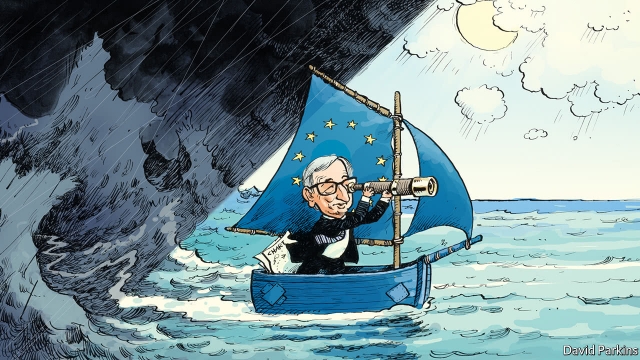Juncker proposes a one-president and no unanimity system
This year’s State of the Union speech from the European Commission President Jean-Claude Juncker has certainly been the most long-anticipated and important speech of his term, as many analysts have noted. It was important not only due to 2018 being the last full-year of Juncker’s Presidency, but also due to the fact that the European Union had a highly successful 2017 after series of populist threats in 2016 and a year after Brexit and the US elections.

Source of the photo: The Economist
Politics is often a skill that connects several actions. Juncker demonstrated this by emphasizing his reformist agenda and optimism, side by side, aware that most of his mandate has passed and that he does not want to be remembered as the Commission President during whose term Brexit happened. Therefore, Juncker could optimistically announce his reformist plans for the upcoming year given that the European economy is performing well, anti-EU populists did not manage to win in key countries and Germany will quite likely see a strong electoral success of pro-EU forces.
The title of his speech was Wind in our sail, a theme which allowed him to point out how the European boat has been cruising along despite shocks and turmoils. While I doubt that Juncker got the inspiration for the title by listening to the song from the American rock band Weezer, it is clear that he does not want things to continue in a Let it be style, to the dissatisfaction of EU critics and Brexit supporters, who were recently joined by the former Beatles drummer Ringo Starr. Therefore, his sixth scenario for the future of the EU will now trigger stimulating discussions.
Juncker has proposed interesting and ambitious initiatives, which can be viewed in light of his old fashioned EU federalism. What caught my attention is the proposition of having a one-man presidency to sail these stormy waters of Europe, which would mean uniting the functions of the European Commission President with the President of the European Council, as well as introducing the system of qualified majority voting on important foreign policy decisions to strengthen the EU identity. For September 2018, the Commission plans to increase the use of qualified majority voting in the Common Foreign Policy. This could be done without changing the existent treaties.
The argument for Juncker is that the strong one-president structure would foster and additionally legitimize the Spitzenkandidaten system which has been introduced at the last European elections in 2014, where he himself was the leading candidate of the European People’s Party. In the current Commission term, we have seen Juncker and Tusk collaborating effectively, and combining their advantages to a level which we could call a good balance. Needless to say, Tusk has reminded Old Europe of the slightly forgotten Polish pro-EU stance, being a valuable addition to the EU. To add fuel to the fire, the current government in Poland would certainly not support Juncker’s idea of switching to a qualified majority voting instead of unanimity for key decisions such as foreign policy initiatives.
The first reactions on Juncker’s ideas are mixed. For instance, the Danish Prime Minister Lars Lokke Rasmussen tweeted against the idea, while the Dutch Prime Minister Mark Rutte called Juncker a romantic. However romantic or unrealistic Juncker’s ideas might be, a strong one-voice leader, standing out with his charisma and authority á la Merkel, could be the key advancement for branding the European Union as a Union of all citizens, which could unite bankers from Germany, farmers from Latvia and pensioners from Finland. However, wishes are one thing while reality is another.
Therefore, Juncker’s 2017 State of the Union speech will now serve as an excellent food for thought on the future of the EU, to see what is achievable and what is not. It is clear Europeans will now have an interesting ship sail with Captain Jean-Claude. All aboard for 2018.
